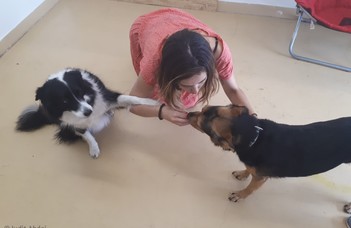Is there a green eyed monster in dogs?

Most of us knows the feeling when a Third person appears in our relationship (either considering a romantic or a parent-child relationship), regardless of whether the threat is real or not. Jealousy in humans emerge quite early, half-year-old infants already show jealous behaviour. However, we do not know whether this emotion is unique to humans or more widespread among animals. Researchers from the Department of Ethology, Eötvös Loránd University and MTA-ELTE Comparative Ethology Research Group in Budapest, Hungary investigated this question in their new research.
Dog owners often say that their dog gets jealous when they focus their attention to another dog or a person. Is it really the case, or do we only anthropomorphise about our best friend?
Two previous studies provided ambiguous results, thus the team of the Family Dog Project set out to find some evidence for jealous behaviour in dogs. “Jealous behaviour emerges when an important relationship of an individual is threatened by a third-party. Thus, in contrast to previous investigations we used a real dog as a rival, because this is the situation when the dog-owner relationship really is in “danger”.” – explained the new aspect of the study Judit Abdai, the leader of the work.
In the study published in Scientific Reports, four potential rivals were introduced to dogs, two dogs (familiar and unfamiliar to the subject) and two objects (familiar and unfamiliar to the subject). Owners had to focus their attention and treat all potential rivals as dogs, while they completely ignored the presence of the subject.
“Dogs showed similar behaviour as infants around one year of age, when their mother is attentive to another baby. Dogs tried to interrupt the owner-rival interaction, and attempted to call their owner’s attention to themselves, but only when the owner was petting the other dogs.” – added Abdai.

Due to the procedure applied and further information collected from the owners, researchers could exclude several other explanations that may account for their results. “Territoriality does not explain dogs’ behaviour as we tested them at an unfamiliar place, and dominance rank among dogs within the households also did not have an effect.” – Cristina Baño Terencio, co-author of the paper added. Knowledge about dogs’ jealous behaviour can be very informative for people owning more than one dog. A new baby in the family may also make the dog jealous.
“This research provides important information in research on jealousy, but we still don’t know whether jealous behaviour in dogs and humans is controlled by the same emotion” - concluded Ádám Miklósi, head of department and co-author of the study. – “The investigation can serve as a basis for future studies on managing behavioural problems originating from jealousy.”
Scientific Reports: https://www.nature.com/articles/s41598-018-27251-1

